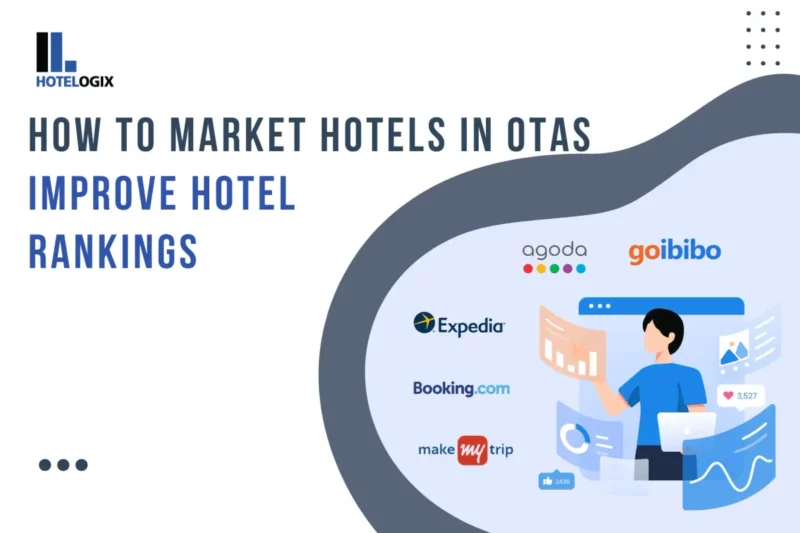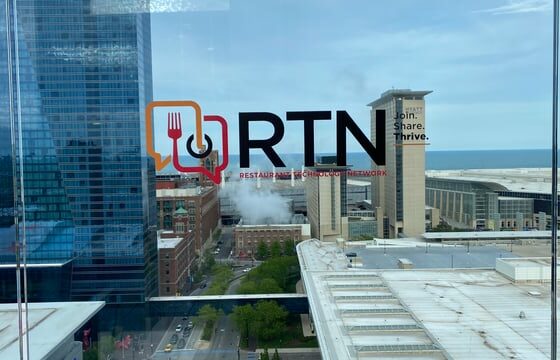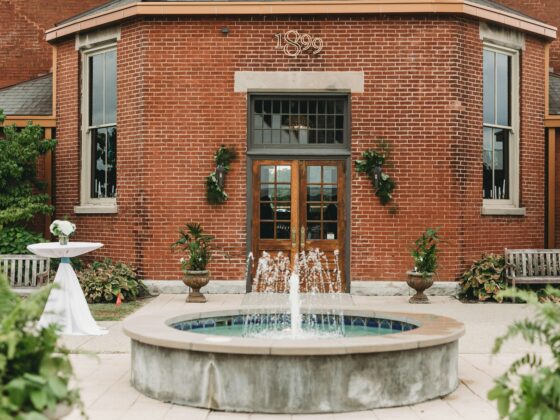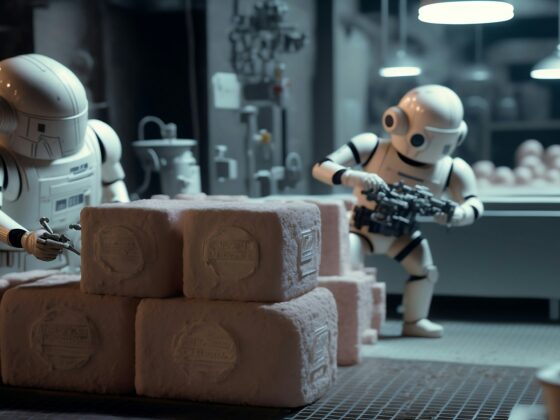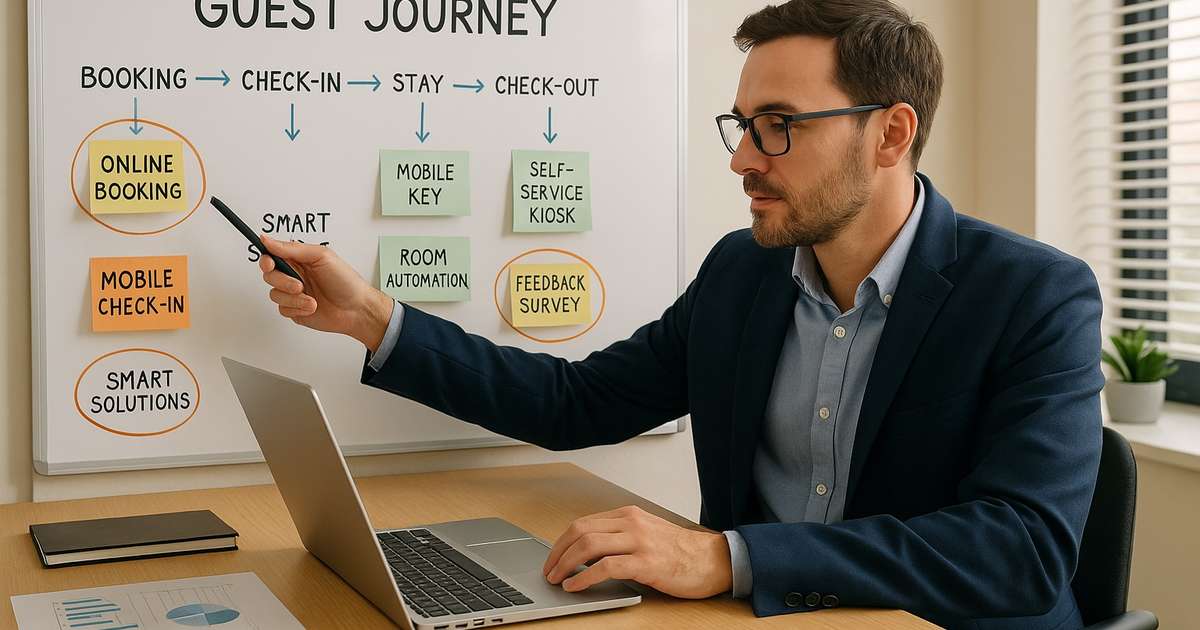
Will your job exist in five years’ time? In the age of AI, it’s something many of us are asking ourselves, particularly as hospitality’s evolution picks up speed.
The latest episode of Matt Talks explores this uncomfortable question, as well as how roles are changing and what new job titles we might see in the near future. Here are the highlights.
The roles on the way out
Let’s start with the obvious: automation is coming for all the repetitive stuff. Manual data entry? Gone. Night audit? Already obsolete in forward-thinking properties. Reservation agents? Their function is shifting – not disappearing but evolving into roles where tech does the heavy lifting and humans focus on creating value.
It’s not just hospitality, either. Lawyers, accountants, marketers – we’re all being reshaped by AI. And yes, even creatives like copywriters are feeling the heat (gulp). AI can now produce content at speed and scale that simply wasn’t possible before.
That doesn’t mean these jobs vanish overnight. But the scope changes. It’s those who cling to the old ways who risk becoming an endangered species.
Embracing AI: a new skillset for a new era
The winners in this shift will be the ones who lean in. Who recognize that AI isn’t a threat, it’s a tool. A very powerful one. It can elevate output, unlock personalization at scale, and streamline everything from check-in to guest comms – but only if you let it.
Take the revenue manager. A role built on data and forecasts. AI can do the number crunching in seconds, but it still takes human strategy to steer the ship. The future revenue manager isn’t afraid of AI, they use it to their advantage, focusing more on guest lifetime value and less on yesterday’s RevPAR.
From transactional to transformational
The most exciting shift in this new era? Moving away from transactional roles to transformational ones. No more, “Can I have your passport and credit card?” Instead: what can we do for this guest that they’ll never forget?
This is where the human element becomes irreplaceable. AI can flag that it’s a guest’s birthday, but it takes human engagement and empathy to build on those insights. If you know this guest is lactose intolerant, for instance, you know not to send them the standard cake. These are the new expectations, and they’re opportunities to delight.
Mews is already experimenting with tech that makes this possible. From selfie-enabled check-ins to AI-generated guest insights, we’re helping hotels recognize returning guests instantly and tailor the experience to them in real time. Personalized, frictionless, memorable.
That’s the real job of the future: making humans feel seen.
The rise of the hospitality technologist
So what new roles are we seeing? Enter the hospitality technologist. Not necessarily a coder, but someone who can bridge the gap between tech and guest experience. They understand APIs. They understand UX. But more importantly, they understandhoteliers andguests. They know what needs to be built, when to buy, and how to integrate tech without overwhelming staff or compromising service.
Think of them as experience architects, mapping out the entire guest journey and pinpointing where smart solutions can elevate it.
This is not a traditional hire, but it’s something every hotel needs to start thinking about. Your tech stack is now your competitive edge, and managing it well is the difference between scaling successfully or stalling.
Evolving education for future talent
Hospitality has always been people-first, but if the next generation is going to thrive, the way we educate and hire them needs a serious upgrade.
There’s a growing tension between traditional hospitality education and the demands of modern hotels. Textbooks can’t keep pace with today’s real-world complexity. With world-class courses now freely available online, access to foundational knowledge is no longer the barrier. The gap lies in preparing graduates to thrive in a fast-changing, tech-forward, guest-centric world.
Hiring from hotel schools isn’t inherently flawed, but hiring solelybecause of hotel school credentials misses the point. We shouldn’t seek to replicate what’s worked before, but to bring in fresh perspectives that challenge the status quo. Conflict, difference and creative tension aren’t liabilities – they’re how great teams innovate.
At Mews, we recently hired a hotel school graduate, but not because of their degree. It was their entrepreneurial drive that stood out. They had launched a business straight out of school, gained hands-on experience, made mistakes, learned quickly and kept going. That’s the mindset we need in hospitality: resilient, adaptable, unafraid to fail forward.
This kind of thinking doesn’t always come from hospitality schools. It might come from a tech bootcamp, a start-up founder, or someone who’s spent more time on Reddit than in a classroom. And employer branding and job descriptions must evolve to reflect this shift.
Transforming job descriptions for modern roles
The language we use to attract talent matters. Old templates won’t bring in new thinkers.
Instead of asking for experience with legacy systems, ask for curiosity and problem-solving. Instead of looking for someone to manage rates, look for someone ready to own the total revenue opportunity of the hotel. These aren’t small tweaks. They’re mindset shifts.
A job description that says“entrepreneur wanted to transform our revenue approach” will attract a different kind of candidate, one who sees opportunity instead of process. And once that person is in the building, the ripple effects are profound.
From entry-level to leadership, hospitality needs people with empathy, grit and the courage to challenge assumptions. These are the people who ask better questions, who lean into uncertainty, and who help hotels become more agile, human-centric businesses.
The future is human (but enhanced)
Let’s be clear: the goal isn’t about replacing people with machines. It’s about giving your team better tools, empowering them to do what they do best: creating unforgettable guest experiences.
Yes, some roles will disappear. But more engaging, stimulating and human roles will take their place. And the people who thrive will be those who embrace change, who stay curious, and who ask: how can we make this better?
That’s the future of hospitality. And it’s already here.
For a deeper dive into this topic, watch the latest episode of Matt Talks, featuring Mews CEO, Matt Welle, and Senior Director of Communications and Regional Marketing, George Barker.
About Mews
Mews is the leading platform for the new era of hospitality. Powering over 12,500 customers across more than 85 countries, Mews Hospitality Cloud is designed to streamline operations for modern hoteliers, transform the guest experience and create more profitable businesses. Customers include BWH Hotels, Strawberry, The Social Hub and Airelles Collection. Mews was named Best PMS (2024, 2025) and listed among the Best Places to Work in Hotel Tech (2021, 2022, 2024, 2025) by Hotel Tech Report. Mews has raised $410 million from investors including Growth Equity at Goldman Sachs Alternatives, Kinnevik and Tiger Global to transform hospitality.

